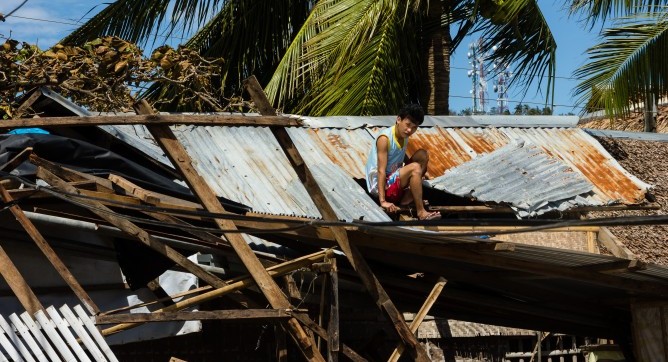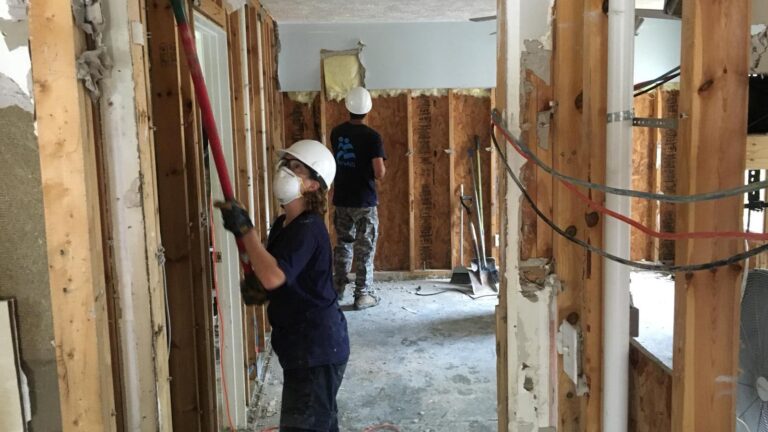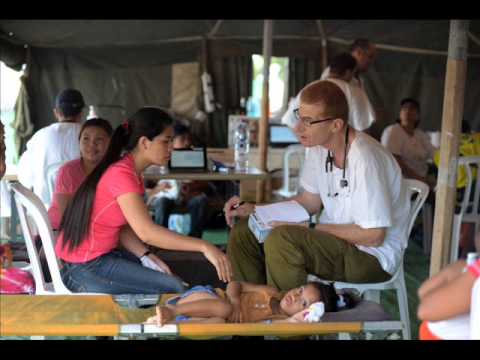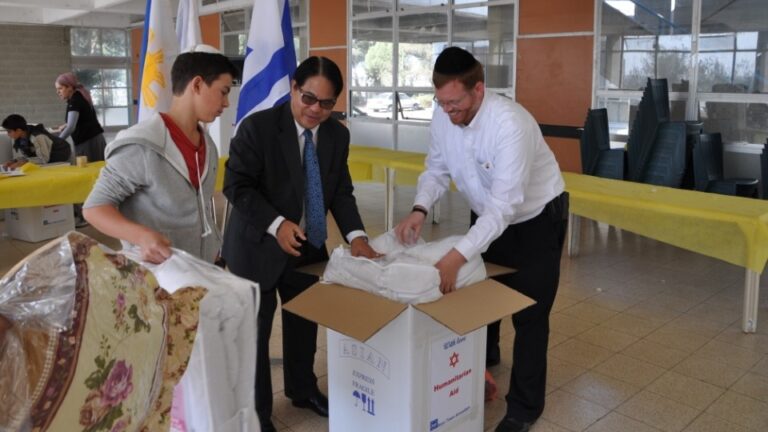Feelings of sadness and despair prevail in typhoon-ravaged areas in the Philippines, following one of the most powerful natural disasters to make landfall in recorded history. Israelis on the scene describe total chaos, but say that Israel’s quick response to send humanitarian and medical aid has given Filipinos hope and has been received with tremendous gratitude.
“It’s a hard feeling to see what’s going on. The place is really destroyed. Everything that could fall has fallen. All the systems — water, sewage, fuel, food, electricity – are gone. Nothing is left,” Adam Levene, deputy chief of mission at the Embassy of Israel in the Philippines, tells ISRAEL21c in a telephone call repeatedly disrupted by faulty phone lines.
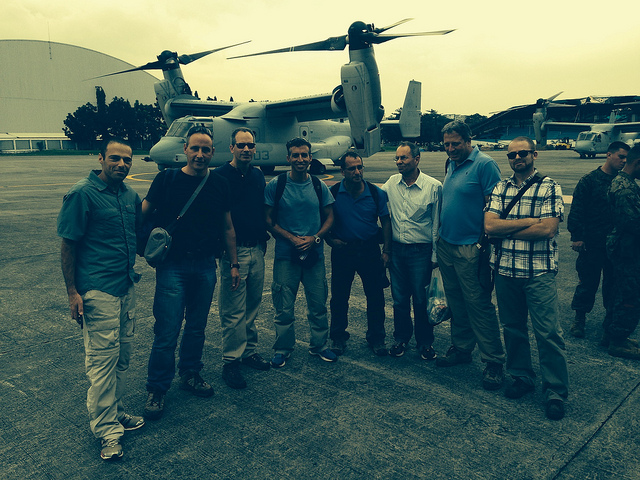
- Israeli first responders in the Philippines. Photo courtesy of Israeli Embassy in the Philippines
Levene joined an Israeli first-responder mission to the severely damaged city of Tacloban, capital of the Leyte Province. When speaking to ISRAEL21c, he was on his way to Cebu – the island where aid was being dropped off.
“You see the people and they didn’t have much before and now they have even less. You feel their sadness. But because you’re coming with a mission to do some good, you see things are bad and you see that you can make things better,” he says.
Israel was among the first countries to send support to the devastated archipelago. Within hours of Typhoon Haiyan’s ruin, Israeli medical professionals and aid workers, as well as government officials and a first-responder Home Front Command team, set out to see how they could help.
Prime Minister Benjamin Netanyahu and President Shimon Peres wrote to Philippine President Benigno Aquino expressing condolences and extending the wish that Israel’s assistance will alleviate the suffering.
“People are so grateful for the Israeli aid,” says Levene. “The people expected help from their allies, but there’s a feeling of extreme appreciation and gratitude when they see aid coming from the other side of the world.”
An Israeli field hospital in Daanbantayan
The lead expedition of four IDF search, rescue and medical experts, plus two government officials, quickly relayed the need for a rapid response. Israel Defense Forces (IDF) Chief of Staff Benny Gantz deployed a large-scale delegation to the disaster zone and to set up a field hospital in Daanbantayan.
On November 13, the IDF sent two planes carrying 148 search, rescue, humanitarian and medical personnel to the affected areas.
The army’s advanced multi-department field hospital will be equipped with approximately 100 tons of humanitarian and medical supplies from Israel, to provide medical care for disaster casualties.
“The hospital has collapsed,” says Levene of Tacloban’s medical facility. “They need everything — all basic medical equipment, water purification. Everything.”
After visiting Tacloban and Daanbantayan — at the northern tip of Cebu island — the IDF team decided to set up its field hospital in the latter area, citing it had a great need for medical treatment.
The UN estimates that more than 11 million people may have been affected by Typhoon Haiyan and up to 673,000 people displaced. President Aquino said the death toll was likely around 2,500.
Levene tells ISRAEL21c that while Tacloban is in total disarray, the smaller towns nearby have even “harder images.”
The IDF facility will include wards for children, women, ambulatory patients and general admission, operated by IDF doctors, nurses, paramedics, pharmacists, mental health professionals and x-ray and technician technicians.
Scant access to food and water
IsraAID , the Israel Forum for International Humanitarian Aid (supported by the AJC and Jewish communities in North America), also plans on making a field hospital.
On Sunday, less than 48 hours after the storm, IsraAID sent a team to the Philippines to provide critical health interventions in the hardest-hit areas. The Israelis will help local NGOs and UN agencies in treating hundreds of thousands of people affected.
“You have to understand that it is relatively hard to get in there. We have been working with our local contacts to secure private flights into [the disaster zone],” IsraAID head Shachar Zahavi told ISRAEL21c on Wednesday.
“The local community has barely any access to food and water, so there is rioting and looting. There are seven medical members from Israel, paramedics, doctors and nurses, on site at the location.”
Zahavi told about another international aid agency’s truck being attacked by hungry crowds and stressed the difficult situation on the ground. “The Philippine government has decided that currently any foreign aid group would need security. IsraAID secured local army personnel headed by a local general to escort and guard our team. [On Thursday] the IsraAID team will accompany American army personnel to assess the situation in the surrounding region of Tacloban,” he said. “We will also send a small group to check north of Cebu affected areas to learn how to also coordinate with the IDF field hospital.”
A second IsraAID team of 15 to 20 medical and trauma personnel was being organized to join the mission in the Philippines.
A delegation from Sauveteurs Sans Frontieres (Savers without Borders) – including a professional medical team of seven volunteers – also set off for the Philippines to help with initial rescue and lifesaving medical aid.
A mission of tikkun olam
When a natural disaster hits, Israeli relief workers are known to be among the first responders.
Israeli organizations have proven experience dealing with disaster relief in Georgia during wartime, Haiti after the earthquake, Japan after the nuclear tragedy, cyclone victims in Myanmar , long-term rehabilitation and relief in Southeast Asia following the devastating tsunami, as well as countless other rescue missions.
Israel has won international praise for the speed and expertise with which it responds to disasters with humanitarian missions sponsored by the government and non-profit associations.
Flying the Israeli flag wherever they go, groups including IsraAID, Savers without Borders, the IDF, ZAKA , Israel Flying Aid, Magen David Adom, Tevel B’Tzedek, the Negev Institute, Natan-The Israeli Coalition for Humanitarian Support, the Israeli Council for Volunteering – and many others — are all on a mission of repairing the world (tikkun olam).
“The Home Front Command has soldiers and officers who excel in the fields of search and rescue, and highly professional medical doctors experienced in such complex missions. Over the years they have been to Japan, Haiti, Ghana, Bulgaria and Turkey, where they diligently donated from their resources and knowledge to those in need,” says IDF Spokesperson Lt. Col. Peter Lerner.
Karin Kloosterman contributed to this report.




